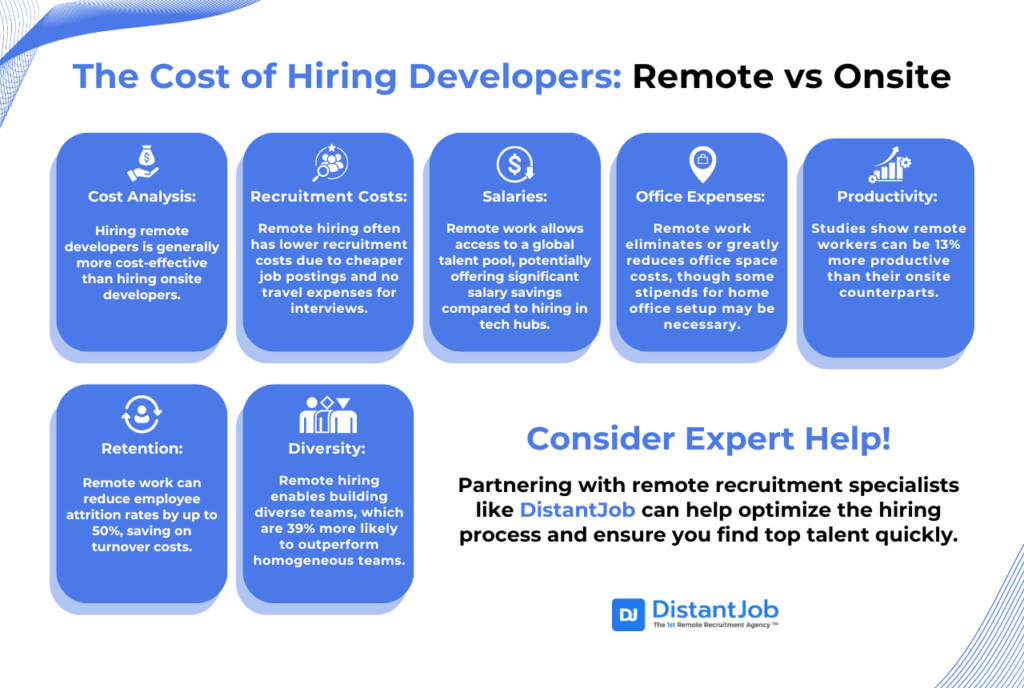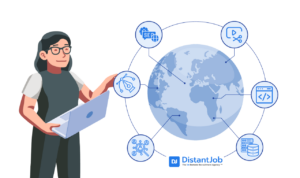The cost of hiring a remote developer can vary from $15,000 to $150,000 per year, or hourly rates between $15 and $150. What defines the cost itself are several factors, such as the type and complexity of the project, the location where developers are based, and their level of experience and qualifications.
Should you hire remote or onsite developers? One way to decide is with a cost-benefit analysis. This assessment provides a quick and efficient way to identify the values and justification of each hiring option.
A cost analysis enables you to hire the developers who suit your business and financial needs. However, failing to conduct this analysis can lead to several drawbacks, including resource wastage, decreased productivity, and a high turnover rate. These issues will eventually hurt your bottom line.
In this blog post, we break down the cost of hiring remote and onsite software engineers. In the end, you can choose which option works best for you.
The Cost of Hiring Developers: Remote vs Onsite

Whether you’re recruiting developers to work in your physical office or remotely, it comes with certain costs. Knowing what these expenses entail can help you make a more informed decision.
Here’s how the costs of these two hiring options stack up against each other:
1. Hiring Cost
Remote:
Remote hiring can help you save money on posting job ads because online job boards are affordable. These platforms can reach a global audience, which means a larger candidate pool. As a result, it reduces the need for expensive headhunting services.
However, you may need to invest in video conferencing software and train hiring managers on remote interviewing techniques.
Onsite:
Compared to online job sites, posting jobs on local platforms can be quite expensive, especially in competitive markets. In-person interviews also add to your expenses. For instance, if you are hiring non-local candidates, you may have to cover travel and accommodation costs. Add these to the time spent conducting these interviews, and you realize how resource-intensive this hiring option is.
Verdict: Remote hiring generally offers significant cost savings in the recruitment process.
2. Time-to-Hire
Remote:
With access to a diverse talent pool, you can quickly find candidates that meet your requirements. The flexibility of remote arrangements also means you can schedule interviews according to individual candidate needs. This reduces the recruitment timeline and associated costs.
Onsite:
On the other hand, hiring on-site means a smaller talent pool and a longer time to find the right candidates. In addition, in-person interviews take longer to complete due to travel and scheduling challenges. All of these prolong the recruitment cycle.
Verdict: Remote hiring saves costs by shortening the hiring time.
3. Salaries and Compensation
Remote:
With remote work, you have access to a global talent pool. What does this mean? It means you can often offer lower attractive salaries while still attracting high-quality candidates. For instance, instead of paying a senior developer in the US $150,000 annually, a company can hire one in Eastern Europe with a similar skillset and pay $50,000-$80,000.
Remote work also allows for flexible compensation packages. For example, a company might offer a lower base salary but include performance-based bonuses, stock options, or other exciting incentives.
Onsite:
On-site developers often come with higher salary expectations and overhead costs.
To better understand the difference in compensation between hiring remote vs onsite developers, let’s look at the table below.
| Country | Average Salary (USD) | Average Hourly Rate (USD) |
| Canada | $80,000 – $100,000 | $40-$60 |
| United States | $100,000 – $120,000 | $50-$70 |
| Mexico | $20,000 – $30,000 | $10-$20 |
| Brazil | $15,000 – $25,000 | $8-$15 |
| Romania | $15,000 – $25,000 | $8-$15 |
| Ukraine | $10,000 – $20,000 | $5-$12 |
| Poland | $20,000 – $30,000 | $10-$20 |
| India | $8,000 – $15,000 | $4-$8 |
| Philippines | $5,000-$12,000 | $3-$6 |
| Germany | $60,000 – $80,000 | $30-$40 |
| Japan | $50,000 – $70,000 | $25-$35 |
This table shows that developer compensation is lower in other parts of the world than in the United States. This is partly due to the high cost of living and the competition for talent.
In addition, onsite roles often come with more expensive benefits packages. These might include health insurance, retirement plans, gym membership, catered lunch, and other perks that can increase the compensation package.
Verdict: Remote hiring offers significant potential for salary cost savings.
4. Office Space
Remote:
Opting to hire remote engineers also helps companies save on office-related expenses. They can reduce or eliminate costs associated with office space, including rent, property taxes, and utilities.
However, with a remote team, you will need to provide a stipend for home office setup.
Onsite:
Rent in tech hubs can go for $50-$600 per square foot annually. For a team of 50 developers, assuming 150 square feet per person, this could translate to $375,000 to $750,000 per year just in rent. In addition to rent, you have to furnish the place, pay for utilities, and maybe hire a cleaning service—it all
Verdict: Remote hiring substantially reduces office-related expenses.
5. Technology and Infrastructure
Remote:
The success of a remote work arrangement highly depends on the ability to collaborate effectively. So, you need to invest in your tech stack. Tools like Slack, Asana, Github, and Zoom are crucial to helping your team stay connected.
You will also need to invest in secure access solutions, such as VPNs and encryption software, to ensure data safety and privacy.
Onsite:
On the flip side, with onsite teams, you are looking at more traditional IT costs. This includes services, networks, and hardware maintenance.
While onsite solutions might be old-fashioned, they allow you to save money on software licenses. Plus, employees can easily access technical support.
Verdict: Both options have pros and cons; costs may be similar depending on specific needs.
6. Training and Onboarding
Remote:
With remote hires, you’re basically creating a virtual welcome wagon. You will need to invest in a reliable online training platform and digital resources.
You may also have to accept that onboarding might take longer. Most of the process will be self-paced, which may lead to a longer integration time.
Onsite:
Onsite developers can benefit from in-person training, shadowing colleagues, impromptu learning, and more. It is often quicker to get people up to speed when they can tap their neighbor on the shoulder and say, ‘Hey, how do I do this again?”
Verdict: Onsite hiring may have a slight edge in terms of onboarding efficiency and team-building.
7. Legal and Compliance
Remote:
If you are hiring remotely, you must acquaint yourself with the employment laws of the country in which your employees are based. Each country has labor laws, tax regulations, and data protection rules.
You might need to set up legal entities in different countries or use an employer of record service. Intellectual property rights are another important aspect to consider when recruiting international talent. All these can increase the cost of legal representation.
Onsite:
For on-site teams, it is generally simpler. You are dealing with one set of laws and one tax system. But you must remain on top of local regulations, especially in places with complex labor laws.
Verdict: Both options require legal support, so this is also a draw.
Cost Calculator
This head-to-head cost analysis of hiring onsite vs remote developers shows that hiring remotely saves you more money.
| Cost Factors | Cost |
|---|---|
| Salary | $84,777 |
| Benefits | $15,000 |
| Office rent | $0 |
| Utilities | $0 |
| Office supplies | $0 |
| Initial equipment costs | $1,500 |
| Maintenance cost | $500 |
| Training costs | $2,000 |
| Travel costs | $0 |
| Total cost | $103,277 |
Note: This cost calculator compares hiring a remote developer versus a local one based on data from reputable sources, such as the Bureau of Labor Statistics, Glassdoor, PayScale, Stack Overflow Developer Survey, Robert Half Technology Salary Guide, and Dice Salary Report. While we strive for accuracy, actual costs may vary based on factors like location and experience.
What Are The Cost Benefits of Hiring Remote vs Office-Based Developers
Beyond direct cost savings, remote hiring offers several advantages that positively impact ROI:
1. Flexibility and Scalability
As we continue navigating these uncertain economic times, it is important to be able to adjust quickly. Remote hiring enables you to do that.
With access to a wider talent pool, you can explore more flexible hiring models. From short-term freelancers to contract-to-hire permanent options, you can find talent that fits your current requirements
This talent elasticity allows organizations to control workforce costs more effectively while still being able to scale as needed. A flexible workforce also reduces the reliance on office space, full-time headcount, and PTO.
According to CNN Money, firms can save $11,000 per employee by allowing them to work remotely at least half the time.
2. Greater Productivity
When employees work in an environment they feel comfortable in, it reflects in their performance.
A study of 16,000 workers over 9 months by Standford revealed that working from home increased their productivity by 13%. This boost in performance resulted from more calls per minute due to a quieter, more convenient environment. The research also found that these workers took fewer breaks and sick days when they worked remotely.
It makes sense. Your distributed dev team will naturally work faster without distractions from their colleagues. Since they’re in their own space, most of their activities, including breaks, will be done around that area.
3. Increased Employee Retention
The same report by Standford says that the workers reported improved job satisfaction and attrition rates reduced by 50%.
Happy employees are productive, and productive employees are highly likely to stick around for long. This is an outcome you want because the opposite is more costly.
According to Gallup, the cost of replacing an employee can be as high as one-half or two times that employee’s annual salary. The consulting firm further said that US businesses lose a combined $1 trillion to voluntary turnovers.
4. Diverse Perspectives
Diversity fuels innovation. A remote team of developers from different geographical and cultural backgrounds can provide unique perspectives, resulting in more creative problem-solving approaches. Moreover, diverse teams are 39% more likely to outperform homogeneous teams.
Save Costs With DistantJob
Hiring remote developers costs less. Although it requires some upfront investments in tech and infrastructure, the long-term benefits outweigh the initial costs.
The best way to save costs by hiring top-tier developers is by building a solid recruitment process. Or working with recruitment experts with all the strategies to headhunt the best developers in the industry.
At DistantJob, we can help you find and hire top-tier remote developers within two weeks, ensuring you get the best talent for your specific needs. Ready to explore the benefits of remote hiring? Contact DistantJob today to start building your ideal remote development team.




